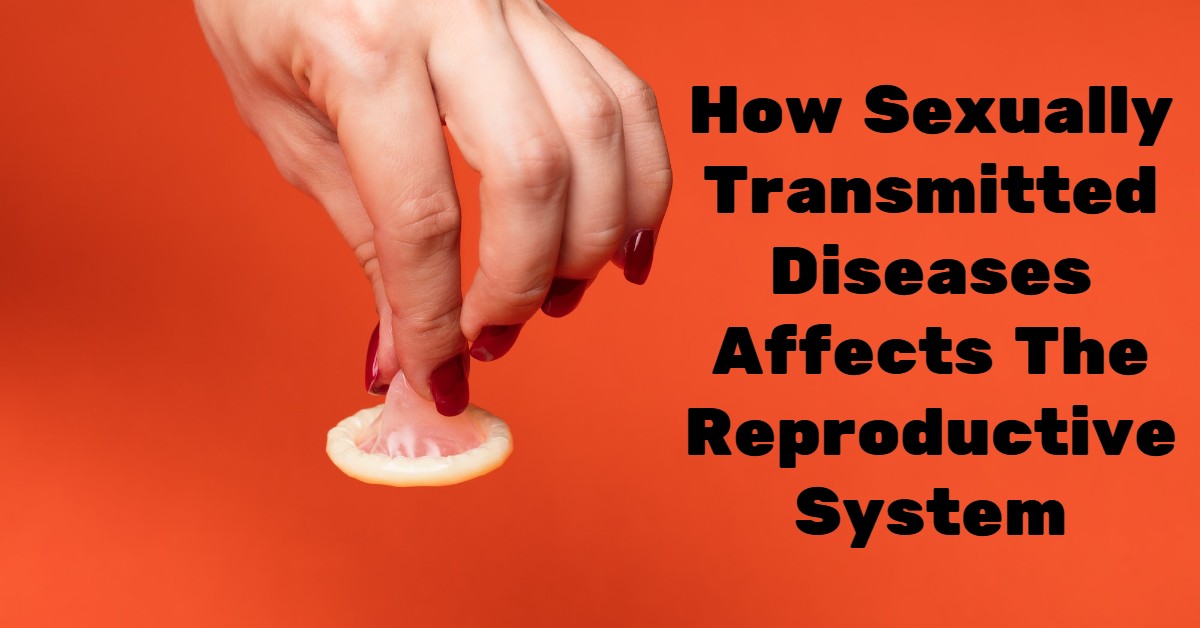How STDs Affect The Reproductive System( Sure Tips)

How STDs Affect The Reproductive System: Picture this: you have a beautiful garden, carefully tended to with love and attention. But suddenly, an invasive pest infiltrates your garden, spreading its destructive influence and wreaking havoc on your precious plants.

In a similar way, sexually transmitted diseases can invade the reproductive system, causing damage and wreaking havoc on the delicate balance of fertility and sexual health. Let’s delve deeper into how STDs can affect the reproductive system and the importance of prevention and treatment.
FAQs & Answers on How STDs Affect The Reproductive System
Can chlamydia cause infertility?
Yes. Chlamydia can result in female infertility owing to tubal infertility if it is not treated. This happens when fallopian tube irritation results in scarring, which may stop a fertilised egg from making it to the uterus.
Can a man be infertile?
Yes. About 30% to 50% of all infertility cases fall under the category of male factor infertility. Male fertility can be impacted by certain hormonal illnesses, genetic conditions, or a decline in testicular or ejaculatory function. Being overweight or obese, excessive alcohol use, smoking, radiation exposure, and more are other risk factors.
Can men get PID?
Pelvic inflammatory disease (PID) cannot affect men. This is due to the fact that PID primarily impacts a woman’s reproductive organs. A frequent risk factor for PID is an untreated STI.
Infertility in women, especially that caused by the tubal ligand, is a serious global public health issue. The majority of tubal factor infertility cases are caused by untreated STDs that travel up the reproductive canal and are capable of inflaming, damaging, and scarring the tubal lining. Chlamydia trachomatis and Neisseria gonorrhoeae have often been linked to pelvic inflammatory illness and tubal factor infertility as pathogenic microorganisms that affect the reproductive system.
In the medical literature, there is very weak support for the idea that additional STDs, such as Mycoplasma genitalium, Trichomonas vaginalis, and other microbes in the vaginal microbiome, may play a significant role in the pathogenesis of infertility. Finding reversible causes of tubal factor infertility will require more research into the vaginal flora and other possible infections. A remedy for the ongoing burden of infertility may be found in improved clinical screening and the avoidance of ascending infection.
What is STD?
STD stands for Sexually Transmitted Disease. It is an infection that is spread through sexual contact, including vaginal, anal, and oral sex. STDs are caused by bacteria, viruses, or parasites that can be transmitted from one person to another during sexual activity.
Some of the most common STDs include chlamydia, gonorrhea, syphilis, herpes, and human papillomavirus (HPV). While some STDs may not have noticeable symptoms, others can cause serious health problems if left untreated. It is important to practice safe sex by using condoms and getting regular STD testing to prevent the spread of STDs and protect one’s own sexual health.
Can STDs affect your ability to have children?
STDs, which are sexually transmitted diseases, can lead to infertility. When this occurs, it’s typically as a result of a persistent infection that was left untreated for a long time. Male infertility caused by STDs is less frequent than female infertility. This is partially due to the higher likelihood of symptoms in males with STD infections. As a result, they are more likely to receive treatment.
Infertility brought on by STDs is covered in this article. Additionally, it examines specific STDs and how each one may contribute to infertility.
How STDs Affects The Reproductive System
STDs (sexually transmitted diseases) can have serious negative effects on reproductive health. Here are some examples of how different STDs can affect reproductive health:
Chlamydia
Chlamydia is a sexually transmitted bacterial infection caused by the bacterium Chlamydia trachomatis. It is one of the most common sexually transmitted diseases (STDs) worldwide and can have serious consequences on the reproductive system. Chlamydia can infect the cervix in women and the urethra in both men and women. If left untreated, the infection can spread to other parts of the reproductive system, including the uterus, fallopian tubes, and ovaries in women and the epididymis and testicles in men.
- In women, chlamydia can cause pelvic inflammatory disease (PID), a serious condition that can lead to chronic pelvic pain, infertility, and ectopic pregnancy. An ectopic pregnancy occurs when the fertilized egg implants outside the uterus, which can be life-threatening for the mother.
- In men, chlamydia can cause epididymitis, which is inflammation of the epididymis that can lead to infertility if left untreated. In rare cases, chlamydia can also cause reactive arthritis, which can lead to joint pain and swelling.
It is important to get tested for STDs, including chlamydia, regularly if you are sexually active. Chlamydia can be easily treated with antibiotics, but if left untreated, it can have serious consequences on the reproductive system. Using condoms during sexual activity can also help reduce the risk of contracting chlamydia and other STDs.
Gonorrhea
Infertility can result from both gonorrhea and chlamydia.1 Gonorrhea can go unnoticed for a long time, just like chlamydia. The majority of female gonorrhea patients show no symptoms. Tubal injury from gonorrhea is common. PID affects 10% to 20% of female gonorrhea patients who are untreated. Infections with gonorrhea probably account for 10% to 20% of all PID cases.
Many men who have gonorrhea may also experience sperm health issues. The two most common causes of avoidable infertility in the United States and around the world are gonorrhea and chlamydia together.
Mycoplasma
Mycoplasma may be present in females with PID who do not have gonorrhea or chlamydia. This sexually transmitted bacteria may be more widespread than gonorrhea in terms of infection rates.
Female infertility and PID have also been linked to mycoplasma infections, but less frequently than with chlamydia or gonorrhea. Additionally, there is some evidence that mycoplasma may cause male fertility to decline.
Herpes
A small body of research suggests that male infertility and herpes may be related. But there hasn’t been much study done on the subject up until now. The limited evidence available shows that a herpes infection may cause a decline in sperm count. Herpes viruses have lastly been discovered inside sperm cells. What effects this could have on starting a successful pregnancy are unknown.
HIV
The biochemical effects of HIV may have an impact on the reproductive system. Infertility may occur from this. Infertility is linked to a number of HIV/AIDS-related illnesses. These consist of:
- PID
- Orchitis
- Acute epididymitis
HIV may have an impact on sperm health, just like herpes, according to certain theories. Males’ semen quality can also be decreased by viral infections and the immune impairment brought on by HIV. As a result, they struggle more to become pregnant with their partners.
Additionally, HIV might make it more difficult to get pregnant or use fertility treatments. Because HIV is sexually contagious, healthcare professionals want to ensure that it is not transferred from one partner to another. Fortunately, there are alternatives for assisted reproduction that can significantly increase the safety of having children while HIV positive.
Syphilis
Syphilis can cause serious complications if left untreated, including damage to the heart, brain, and nervous system. Pregnant women with syphilis can also pass the infection to their unborn child, leading to stillbirth or serious health problems for the baby.
Conclusion
In summary, STDs can have a wide range of negative effects on reproductive health, including infertility, ectopic pregnancy, chronic pelvic pain, cancer, and serious complications for both mothers and babies during pregnancy. It is important to practice safe sex, get regular testing, and seek treatment if you suspect you may have an STD.




